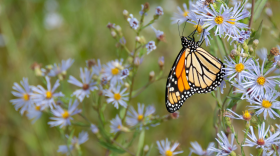-
The Ann Arbor City Council is considering easing regulations regarding property owners' lawns. WEMU’s Kevin Meerschaert reports.
-
Fall has arrived, and the transition towards Michigan’s colder months is underway. Many property owners are already looking ahead and designing spring plans for the lawn. That would include Saline resident Edith Anderson. Edith goes beyond modern landscape design and is “Rebuilding Nature: Yard by Yard.” That’s the title of her recently published book. Edith joined WEMU's David Fair to share why more homeowners are trading sterile lawns for living landscapes that welcome back the birds, bees and butterflies.
-
In an effort to protect pollinators many communities are pushing a "No Mow May" movement. It essentially asks you allow grass to grow six to 12 inches before cutting it for the first time. The City of Ann Arbor is evolving its effort and is advocating a "Pollinator-Aware Yard Care" education and practice program. Community Sustainability Coordinator Sean Reynolds joined WEMU's David Fair to discuss the distinctions and offer advice on making sure our pollinators flourish.
-
It's about that time of year where you'll begin to see people burning leaves, wood, and plant debris where it's allowed in the community. It creates both air and water pollution and impacts the health of our waterways. Add in the issue of fertilizer and phosphorous runoff, and the environmental and ecological impacts add up. WEMU's David Fair discussed the significance of the problem and what's being done about it with Lauren Koloski from the Office of the Washtenaw County Water Resources Commissioner.
-
Now that spring has sprung, there is temptation and desire to get out and begin yard work and gardening. Many experts prefer you wait to better protect bees and other pollinators. On "Issues of the Environment," Ann Arbor councilwoman Erica Briggs joined WEMU's David Fair to discuss the city’s "No Mow May" resolution and its desired impacts and outcomes.
-
A homeowner in Howell has to pay the city for cutting the grass in the public right of way in front of his house. That’s the decision Wednesday from a…

Play Live Radio
Next Up:
0:00
0:00
Available On Air Stations






